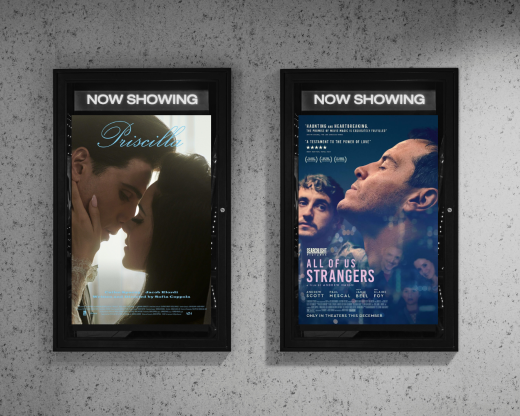
These films were screened at the 61st New York Film Festival. “All of Us Strangers” will have a theatrical release on Dec. 22, 2023, while “Priscilla” will have a limited release on Oct. 27, 2023 before theatrically expanding nationally on Nov. 3, 2023.
Filmmaker Andrew Haigh was operating on a production budget of £120,000 (roughly $145,900) when he first made waves with the 2011 independent film “Weekend.” Despite budgetary limitations, “Weekend” gracefully aged into a cornerstone of modern queer cinema through the sheer will of the two leads.
Three films and over a decade later, Haigh returns to his roots with the hazy hues of “All of Us Strangers,” this time with the help of a ramped-up ensemble and production budget. The end product is a profuse tear-jerker, and it wouldn’t be a stretch to call this the best film of the year.
Loosely adapted from Taichi Yamada’s 1987 novel “Strangers,” the 2023 film follows Adam, played by Andrew Scott, a lonesome screenwriter who finds himself isolated in his desolate London high-rise apartment. To quell his writer’s block, Adam returns to his suburban hometown to discover his middle-aged parents, played by Claire Foy and Jamie Bell, are alive and well despite being killed in a car crash three decades past. They have not aged a day since he last saw them.
Simultaneously, he encounters and develops a romantic relationship with the drunkenly flirty Harry, played by Paul Mescal, forcing Adam to confront both his grief and repressed identity.
During a post-screening Q&A session at the New York Film Festival, Haigh described the film as an “expensive therapy session,” and — by all means — it certainly is. The meticulously detailed setting of Adam’s childhood home reveals profound insights into his journey of reconnecting with his childhood roots.
Apart from the occasional challenge of understanding the Yorkshire accent employed by most of the cast, the directorial attention to detail does not alienate the viewer. Instead, underneath that specificity is a layer of thematic universality, depicting the need to overcome our past while wanting to bridge the gap between those who can and cannot communicate.
In typical Haigh fashion, the emotional moments deliver a high-powered blow, spearheaded by the force of an exceptionally talented cast. Scott’s eyes and nuanced mannerisms capture a considerable amount of emotion, especially when Adam awkwardly comes out to his mother. She fears his potential to develop Acquired Immunodeficiency Syndrome (AIDS) and be ostracized by society.
Adam insists to his mother that societal norms have changed, and people are more open-minded about homosexuality. But regardless of his insistence, the deep scars he carries from the past have not yet healed, even after all the years that passed.
Haigh’s attention to detail also bleeds into the film’s score, with each needle drop symbolically communicating the unsaid and leading to enormously overwhelming emotional crescendos. The British duo Pet Shop Boys’ “Always on My Mind” perfectly performs this technique, re-contextualizing the track as a subtle apology from Adam’s parents for their inability to resolve his childhood trauma.
The structure of the coming-out scene slowly builds the emotional tension, and by the time the chorus hit, I was driven to tears. As a surreal club sequence unfolds halfway into the film, Haigh plays Blur’s subtly doleful “Death of a Party,” which serves as an examination of those who have had their lives ruined by AIDS with the track sonically shrouded by an intricate blend of synthesizers and guitars. In an atypical non-verbal way, it serves as a bold foreshadowing of the impending chaos.
With all its elements, it’s no surprise that “All of Us Strangers” is a peculiar film — a ghost story that dwells in the surreal. Yet, despite its premise, Haigh’s direction and screenplay remarkably maintain the balance between the supernatural and humanity, immersing you into a dream-like state through the saturated pastels captured by the camera. But Adam’s borderline schizophrenia can’t maintain this time-bending façade for long, and the conflicts that ensue in the third act could divide audiences, as Haigh’s screenplay throws in these brash twists and turns that’ll keep you guessing long after the film ends.
Regardless of your opinion of the ending, Adam’s journey of self-acceptance makes for a genuine, near-life-affirming experience. And as Frankie Goes To Hollywood’s “The Power of Love” plays in the background, the lyric, “When the chips are down, I’ll be around with my undying, death-defying love for you,” will stick with me for a long time.
—
When the idea of adapting Priscilla Presley’s memoir “Elvis and Me” came about, Elvis’ estate almost immediately denied director Sofia Coppola the rights to most of Presley’s music. In contrast to Baz Luhrmann’s bombastic 2022 film “Elvis,” which portrayed the singer as a mythical being, “Priscilla” does a full 180, stripping down Elvis’ glamorous representation. It offers an intimate glimpse into an unsettling one-sided affair, culminating in a film that missed the mark on greatness.
The film opens with 14-year-old Priscilla, played by Cailee Spaeny, struggling to acclimate to life in a West German Air Force base with her parents. Searching for an escape, her impressionable eyes catch the attention of a 24-year-old Elvis Presley, played by Jacob Elordi, who is depleted from the nearly unimaginable energy it takes of being rock ‘n’ roll’s shining new star. Priscilla is enamored by his rockstar status and comforted by his fantastical lifestyle. Elvis, on the other hand, is enchanted by her innocence.
Antithetical to the understated romance of “Lost in Translation,” where Coppola was more oblivious to the age gap between the two leads — though I must admit that the comparison isn’t entirely fair considering the fleeting nature of the romance in her 2003 film — the disproportionate power dynamics are unsettlingly omnipresent. Elordi normally wouldn’t have been cast as Elvis Presley due to his staggering stature, but with Coppola’s tendency to break period-accurate details, Elordi’s 6-foot-and-5-inch frame is a clever indicator of the power imbalance within Elvis and Priscilla’s relationship.
It helps that Elordi effortlessly sells his Southern accent while providing several layers of complexity to an already complicated person. His performance is so impressive that it ironically pushes Spaeny’s commendable portrayal of Priscilla into the background. This is unfortunate, though, because “Priscilla” is meant to shed light on a person whose tumultuous story is unknown to most audiences.
Nonetheless, the film does not fail to tell the viewer that their relationship is, in every sense of the word, exploitative. It is reminiscent of the film “An Education,” where a considerably older, wealthy man grooms a seemingly wise-above-her-years schoolgirl, giving her lavish gifts and attention only to discard her once his desires are fulfilled. Then again, “Priscilla” does not portray Elvis as a one-dimensional character. Rather, his personality is far more complex than black and white. He is controlling but in need of emotional support. He constantly cheats on Priscilla but refuses to engage in sexual activities with her until marriage.
Inevitably, the relationship becomes irreparable, with Elvis’ physical and mental health rapidly deteriorating as the film’s end slowly approaches. For example, Coppola uses drugs and pill bottles as motifs to depict his bodily descent. The early stages of their relationship are represented by a single bottle neatly placed on a table, while the closing stages are symbolized by a stack of drugs spilled across a different table. It is only a matter of time before Priscilla is freed from the confinement of her marriage.
But once the movie established that this relationship was producing far more harm than good, the narrative became repetitive. The film’s tone remained meandrous and understated, causing the narrative’s momentum to stall for an uninterrupted half hour. I desperately waited for either Elvis or Priscilla to pull the plug, and once they finally did, the film lost too much steam to create a visceral reaction from me.
Nevertheless, “Priscilla” accomplishes what it sets out to achieve by lavishly shining a much-needed spotlight on the neglected, all the while raising a few moral questions about a widely cherished, highly controversial American icon.


















